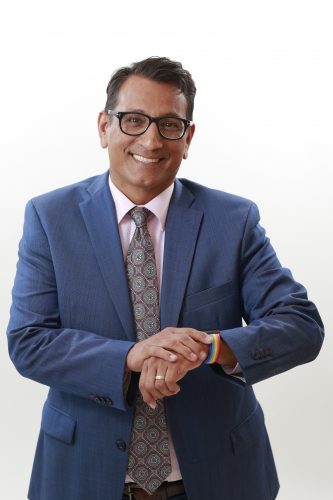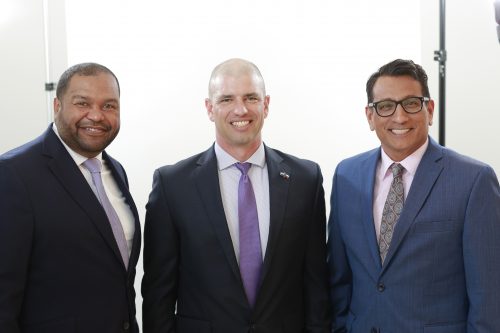
Photo by Trisha Spence
Making All Students Welcome: A Q&A with Frank Hernandez
The College of Education dean focuses on Latino and LGBTQ communities.
Hernandez addresses diversity, equity and inclusion in the classroom and shares his vision for innovation in the field of education. His research highlights the educational issues hindering the Latino and LGBTQ communities and seeks to make improvements to these areas through training tomorrow’s educational leaders.
Where are you from and what was life like in your hometown?
I grew up in West Dallas, which historically has been made up of different barrios and communities. We lived in the Elmer Scott housing project until I was around the second grade. And then my dad got a job in Wichita, Kansas.

The College of Education dean said he wants all students to feel welcome in the classroom. Photo by Carolyn Cruz
So we moved — me and my five brothers and sisters and my mom and dad. And that was where I completed elementary school, middle school and high school, graduated, and ended up going to college in western Kansas, where I got a teaching degree. I came back to Wichita and taught in the same school where I was a student. Then after that, I moved up to Minnesota and lived there for about 20 years before I returned to Texas in 2012.
What do you remember about your own experience in early education? Are there any memories that inspired you about the possibilities of the classroom?
I participated in Head Start. When I was young, my mother was a teachers aide. The bus would come by, she and I would get on and I would go to Head Start. I can’t directly tie that experience to the importance of learning, but I will tell you that it got me excited about being in school. I became very interested by numbers and words and language and used to walk through the apartment complexes just writing down addresses of the different units and the streets.
I think early learning is critical for all students. Even though there may be students who do not need it, it’s a way to socialize kids and engage students in what the learning experience might be. Research has shown that things like preschool and Head Start and engaging parents as teachers have been so critical to the success of students.
Did your upbringing shape your interest in education?
I think it did, but it was my experiences in high school that really got me interested. I was a pretty good student, but I think there’s one experience in particular, when my counselor was meeting with seniors about our next steps. Many of my friends who were Latino or Black were advised to go into the military. We knew that some of the white students were not being encouraged to do that.
I remember sharing that with my mom, and she became very frustrated and upset. She went to the school and said things like “This is unfair” and “You should talk to every student about college.” I think there was a seed planted that education and college, not to denigrate the armed services, was a way to really make a difference, to make a livelihood, to have a career and to do those kinds of things.
I struggled a little bit in college. I actually stopped going and started working. But I realized that I needed a college degree to really influence the kids like me and to be that teacher who could talk to students about college, the importance of doing well and the way a high school diploma and a college degree could give you lots of opportunities and choices.
What first got you interested in the field of education itself and what were your first steps in that direction?
I returned to college at Barclay, a small, private Quaker college. Students there would apply for summer jobs all across the country. I got a job after my freshman year working at the Clark Street Friends House in Des Moines, Iowa. They had a spot for a college student to help run educational programs and arts and crafts for all the kids who lived in the neighborhood.
In the morning, kids would come over to the house and do things like reading or outdoor activities. The way the students engaged with me, the way that I loved leading these educational experiences, the activities and the field trips we would take, convinced me that I should be a teacher. Not just any teacher, but an elementary school teacher.
“I needed a college degree to really influence the kids like me and to be that teacher who could talk to students about college.”
Frank Hernandez
I just was transformed by the lives of those students. I think I made a contribution to them that summer. When I went back to college my sophomore year, I started taking education courses and got on the pathway to being a teacher.
What inspired you to pursue higher education as a career path?
After not doing so well in college at Wichita State, I started getting lots of different jobs. The very last of those jobs was working at a meatpacking company in Wichita, where I worked in a huge factory with metal gloves, heavy coats, hard hats and earplugs because it was so loud.
My job was to process certain meats on conveyor belts. I did that for one week and realized that I didn’t want to do this for the rest of my life and that I really needed to go to college and get a degree to do the things that I was passionate about. When I told my mom I was quitting that job, she was so upset because she thought that this was the American dream job anyone would want and that I could make a good living from it, buy a car and have a house. But I realized that, while this may be something that individuals would want to do, I needed to go to college to get a degree so that I could do something different and more meaningful with my life.
I moved up to Minnesota after I got my bachelor’s degree and taught in Kansas for three years. Soon after, I ended up getting a master’s degree. I became an assistant principal and then a principal of an elementary school. My ultimate dream was to become an urban superintendent. I went to get my PhD at the University of Wisconsin-Madison and soon quit my job as a principal. I went back to school in Madison full time while my family still lived in the Twin Cities.
I worked with my adviser on a research project studying the principals who were committed to leading for social justice. And it was that experience with collecting data, doing interviews, writing up research with her and writing up conference presentations where I decided, instead of being an urban superintendent, I wanted to be a professor. I wanted to prepare teachers, principals and superintendents for their work.
What brought you to TCU?
I was a professor and associate dean at Southern Methodist University before I came to TCU. I had served as a dean before, at the University of Texas of the Permian Basin. When I was at SMU, I got this motivation to be a leader in higher education and in the dean role again. I knew individuals who were familiar with TCU and knew a professor who worked here. When my current position became available, I started reaching out to them asking, “What do you know about TCU’s College of Education?”
I quickly learned that this was an incredible place with unbelievable students and professors and that this college was really doing some amazing things regarding diversity, equity and integration. I decided that TCU was the kind of place I wanted to be and could see myself making a difference. It also became clear to me that I would learn so much from the faculty and the students. That’s really what drove me to apply.
Is there a particular question that you’re trying to answer through your research?
There are a number of questions that I’m trying to answer. One of them is what contributions are Latinx school principals making to the American public school system that are not being captured in the literature, and in what ways? Does their own racial-identity development experience influence their leadership practices as principals?
Another area I focus on is what principals who lead for social justice actually do. How do they think about leadership differently from other principals? How do they engage families and communities around this commitment for social justice?
The third question that I look at is who are the principals and the school leaders who create inclusive environments for students and staff who identify as gay, lesbian, bisexual, transgender and questioning? What are the ways in which they lead? What are the ways in which they engage with their students, their faculty, staff and community members that give them the propensity to want to create an inclusive environment for students who identify as LGBTQ?
What inspired you to take your research in those directions specifically?
In reference to the work around Latino school principals, I was a Latino school principal myself. In the district I worked in, I was the only Latino male principal. I often asked myself, “How are other Latino principals doing in their work?” and “What are some of the successes and the barriers that they’re having?” I also questioned how they think about their own experience as a student and how that drives the ways they think about leadership.

Frank Hernandez, right, counts on Damian Patton, left, Director & Jean W. Roach Chair of Laboratory Schools, and Marc Mitrano, director of development for the College of Education. Photo by Carolyn Cruz
It was wanting to know how many of us exist across the country, where we work, what types of schools we work at, how long it takes us to become principals, what pathways we follow to become a principal to really get a sense of what the trajectory was to become a principal. Then, once we’re in that role, what things have we experienced that we can learn from?
The other two areas really came from some of my own principals who were so committed to supporting students of color, like myself, who were concerned with having amazing experiences in school. In high school, I came out as gay to one of my assistant principals, and he was so supportive and was someone I could talk to about the struggles and challenges I was having when trying to make sense of who I was as an individual.
What is Deans for Impact?
I was fortunate enough to come together with some other teams six or seven years ago with the questions of “How can we make the teacher educational programs in the country the very best?” and “What is it that we have to do as deans to really drive the curricular decisions and the experiences that our teacher candidates are having so that they’re prepared when entering the classroom on day one?”
What this organization has done is look at some programs across the country and take a deep dive into their work, paying close attention to what makes them so successful. Then we’ve looked at the building blocks of teacher education.
We are working with a group of faculty on a program called Learning by Scientific Design. It’s a three-year project to really dig into the science of learning so that we can embed these cognitive principles into our teacher-prep program. When our teacher candidates get into schools, they have a strong understanding of the science of learning principles and can apply those right away.
Another major factor that we’ve focused on is what it means to be an anti-racist teacher. We’re asking ourselves and others how our own mindset and the policies of the school support anti-racist teaching and policies. So, we’re beginning to explore the ways in which we can think about issues of equity and justice in teaching as well.
What changes, positive or negative, do you see occurring in today’s educational environments?
I think Covid-19 has taught us a lot about access to technology and the internet and about the ability to engage. Those concerns need to be acknowledged and addressed.
“Schools and colleges of education must work closely with their community partners to meet the needs of students and their families.”
Frank Hernandez
One of the things we’ve learned is that schools and colleges of education must work closely with their community partners to meet the needs of students and their families. I think the future of education demands that we bring down either the real or imagined walls that divide the university and the community, as well as begin to find ways to create new synergies so that we are working to address some of the biggest challenges we face in education together.
Do you foresee online learning becoming a permanent part of education after the pandemic?
I do think that online learning is here to stay. We want students to access the incredible professors we have in the College of Education and the experiences that other students are getting. But for some, because of distance, it’s hard to drive in for a two- or three-hour class twice a week. So, part of what we have to do is ask ourselves where it makes sense for us to have an online degree program. We need to ask what the market is demanding. We also need to concern ourselves with the ways we can reach more students and raise the profile of our college.
We won’t exchange online learning for the TCU face-to-face experience, but it will be a slice of the work we do. However, we must do it thoughtfully, intentionally and correctly so that whether students are online or in person, they are getting the high-quality instruction, engaging pedagogy and wonderful experiences of education. They can become ambassadors and point out what the TCU College of Education is doing, as well as how they’ve been impressed by its works.
What issues in education are drawing your attention now?
One of the things we are interested in as a college is the impact of Covid-19 on learning. We’re finding that the impact hasn’t been felt equally for some families and communities. We’ve already invested some research work into our community partners and some nonprofits and foundations to be able to document what those experiences have been like, as well as how we can be better prepared in the future to address these issues.
Another thing is that we continue to see low-income students and students of color lag in achievement in comparison to their white counterparts. We’re figuring out how we can make the college or university experience more accessible to some of our students who are really bright and gifted but also financially constrained. We’re engaging in these areas so that we can be a stronger community partner and allow the experiences of our students to drive some of the research work that we do to answer some of the pressing questions.
Editor’s Note: The questions and answers have been edited for length and clarity.

Your comments are welcome
Comments
Related reading:
Research + Discovery
Miriam Ezzani Researches the Role of Educators in Ending Educational Inequality
Self-reflection and anti-oppressive practices help ensure all students have a chance to succeed.
Features, Research + Discovery
Whitney Roach Seeks Ways to Make Schools More Inclusive for Queer Students
In K-12 schools, the researcher found little support for non-heteronormative students and families.
Features, Research + Discovery
How to Turn Kids into Readers
Find a genre and format that will get them interested, from graphic novels to audiobooks.